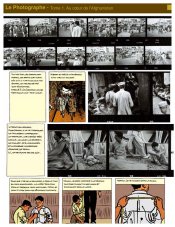I have just finished reading the three-volume bande dessinée "Le photographe" published by Dupuis from 2004 to 2006.
It's an unusual book of comics, in that it integrates together contact sheets with panels. But the real value of it is in its story.
Didier Lefèvre was an independent photojournalist, who liked to spend long periods of time on location, and get to know the people he photographed. In 1986, he escorted a group of French physicians working for Doctors Without Border (which was founded in France too) during their stint in the war zone of Northern Afghanistan. Between the harsh conditions of living, the Soviets on one side, the Mudjaheedin on the other, DWB was tending the sick and the disabled.
The three volumes relate patiently the voyage to and from Northern Afghanistan, like a travel diary. But what I found remarkable about it was the rightness of tone. There is no picturesque drama, no romance with war as a background, no insidious colonialism, no do-gooder post-colonialist mentality, none of that balderdash. Instead, you have a gripping tale of survival, ingenuity, devotion, and mutual respect between cultures.
Afghanistan is the big recurring story on all Western news, but we have no sense of what this country is. If there is one book that has opened my eyes a little about it, I think it's that one.
Do yourself a favour, and work on your French (or your Dutch, I think there's a translation), to read through the three volumes. The photographs are priceless, and the decision to integrate proof sheets with bande dessinée is simply remarkable and effective.
Didier Lefèvre died from a heart attack early in 2007, at 50 years old. He used mostly Leicas and Nikons, with HP5 and Tri-X, for the photos use in "Le photographe"
More information (in French) and pictures here:
http://lephotographe.dupuis.com/didierlefevre.html
and click on "Entrer dans le site".
It's an unusual book of comics, in that it integrates together contact sheets with panels. But the real value of it is in its story.
Didier Lefèvre was an independent photojournalist, who liked to spend long periods of time on location, and get to know the people he photographed. In 1986, he escorted a group of French physicians working for Doctors Without Border (which was founded in France too) during their stint in the war zone of Northern Afghanistan. Between the harsh conditions of living, the Soviets on one side, the Mudjaheedin on the other, DWB was tending the sick and the disabled.
The three volumes relate patiently the voyage to and from Northern Afghanistan, like a travel diary. But what I found remarkable about it was the rightness of tone. There is no picturesque drama, no romance with war as a background, no insidious colonialism, no do-gooder post-colonialist mentality, none of that balderdash. Instead, you have a gripping tale of survival, ingenuity, devotion, and mutual respect between cultures.
Afghanistan is the big recurring story on all Western news, but we have no sense of what this country is. If there is one book that has opened my eyes a little about it, I think it's that one.
Do yourself a favour, and work on your French (or your Dutch, I think there's a translation), to read through the three volumes. The photographs are priceless, and the decision to integrate proof sheets with bande dessinée is simply remarkable and effective.
Didier Lefèvre died from a heart attack early in 2007, at 50 years old. He used mostly Leicas and Nikons, with HP5 and Tri-X, for the photos use in "Le photographe"
More information (in French) and pictures here:
http://lephotographe.dupuis.com/didierlefevre.html
and click on "Entrer dans le site".






